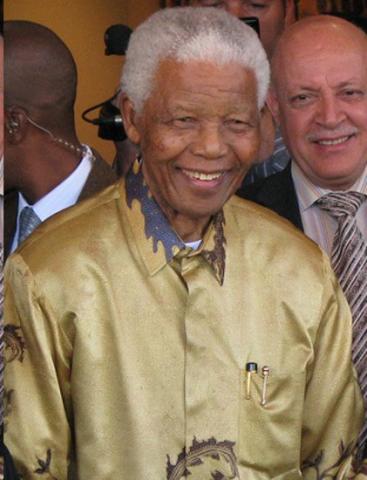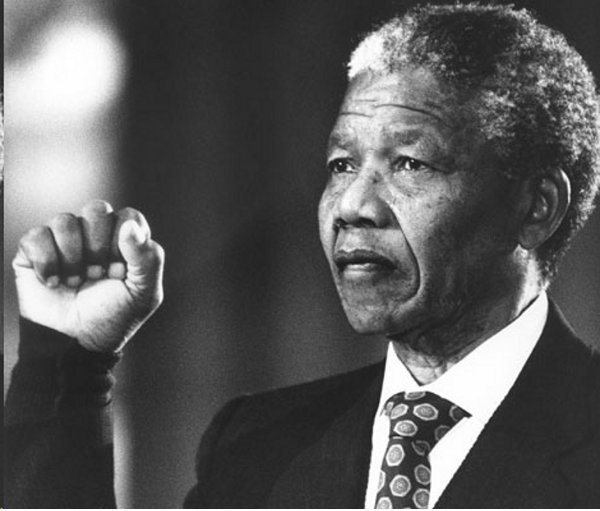Nelson Mandela’s Long Goodbye

From New America and FirstPost:
Nelson Mandela is dying. Hard as it is to accept the fact, the world has to come to terms with it.
It's not surprising that South Africans are praying for his recovery. But perhaps a final gesture of gratitude to the man who is indisputably the Father of the Nation is to pray for his peaceful death. Or passing. Or transition. If those euphemisms offer some solace and sound less final than death.
Nelson Mandela is almost 95. He has been in and out of hospitals three times this year. Newsrooms around the world have probably gotten his obituary ready more than once. His health has gone up and down, each “recovery” a little slower than the previous one. The man's body is tired. Reports say he has not opened his eyes in days and is largely unresponsive.
But as a society, we now have the medical capability to prolong life to a degree our grandparents could never imagine. Every day in hospitals all over, elderly patients, entirely nonfunctional, unable to register anything, are hooked up to ventilators offering some semblance of life and hope to the family around them. And it's a lucrative source of revenue for hospitals, which always seem very eager to strap on the ventilator and charge a hefty fee. A doctor friend once told me that the ventilator was meant as a temporary breathing assistance for a young person who might have had some traumatic injury or illness but who hopefully would fully bounce back to life afterwards. It was never meant to be a semi-permanent breathing solution for a person already dying.
I am not implying at all the hospital in Pretoria has ulterior motives in prolonging Mandela's life. It's just that determining what is the natural end of a life has become increasingly more complicated and fraught for all of us.
The advancement of medical technology has meant a longer life, as well as the hope of recovery from illnesses that felled our grandparents. But it has also meant we can cling on to life with greater tenaciousness and artificiality. Visiting a great-aunt at a hospital not so long ago, I tried to reconcile the jolly beaming woman I knew with the shapeless lump under a hospital sheet, tethered to tubes and a ventilator, reduced to a line on a monitor, silent except for the shuddering intake of breath. Once she looked at me, and her eyes were so full of pain and questions, I had to drop my gaze.
It is hard to let loved ones go. Sometimes it's because the children scattered around the world need to come. But mostly it's because we keep hoping for miracles, that she will get better. At 95 Nelson Mandela, even if he comes out of hospital one more time, is not likely to get better. But we still hope. "Nelson Mandela, for me, is like my father," Alex Siake, a South African, said in Pretoria. "Every day, I just pray that he can recover quickly and be among us again."

However even as we cling to life, no one wants to cling to suffering. The other day I remember worrying about how upset my mother would be about the death of a close friend. But to my surprise, she was almost envious that her friend had died after a stroke in the bathroom without any apparent suffering. The vision of an old age with a broken hip, spiraling diabetes, or a new cancerous tumour, stuck full of needles in an ICU is an ever present terrifying nightmare as we grow older.
But for those around the patient, it's hard to let go because it feels wrong to pull the plug on a loved one. We are not used to, or comfortable, playing God in that fashion. We are plagued by hope against hope. Often the people closest to the dying, the ones likely to be most affected, are the ones who come to terms with letting go. It's the son who lives abroad, rushing in at the last moment, who desperately wants to prolong life by throwing every medical advancement at a tired and battered weary body.
Mandela's daughter Makiziwe is quoted as saying she is praying his "transition is smooth". But Daliwe Bida, a resident of Mandela's native village told the media, "We are praying nonstop because we don't know what can happen if he leaves us." One can understand the stakes are that much higher when it's a person of the stature of Nelson Mandela. The pressure to keep the man alive almost reaches the point of wanting to keep him immortal.
South Africans have been asked to pray for his recovery as if praying for his death would appear ungrateful. As long as he is physically alive he gives a certain reassurance to his nation, and even to the world. Unlike many other statesmen, his stature has not faded around the world even though he has long left office because his stature was never really tied to his office. It preceded him becoming the President of South Africa and lived on after he relinquished that post. In fact, it grew even more powerful that the man who could easily have been South Africa's president for life, in a continent where many freedom-fighting founding fathers chose to do just that, decided to retire.
Yet in his long goodbye, Nelson Mandela is also teaching us something. That no matter how much we want to hold on to something or someone, sometimes we have to let them go. Nelson Mandela has given a lot the world. To let go of Nelson Mandela is perhaps the greatest gift of gratitude the world can offer him at this point.





























































































































































































































































































































